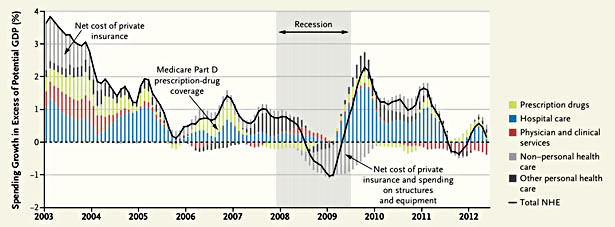Matt Yglesias writes about the awesome power of information technology to diagnose illnesses and save a trip to the doctor:
I was having a kind of weird problem with my left thumb over the course of the past few days….Finally I figured out that it looked to me like an infection of the cuticle….That brought me to a Wikipedia page….”paronychia”….led to a bit more Googling….typically happens to habitual fingernail biters (guilty) or people who’ve recently been in the water a lot (swimming pool on vacation).
Everyone basically agrees that this isn’t a huge deal and that you can obtain some physical relief by occasionally soaking the thumb in hot water while waiting for it to clear up. I took that advice starting yesterday morning, and today I feel a lot better….So there we have it. In a small but real way, information technology reduced the cost of this particular health care service. Productivity for the win.
Obviously there are lots of things we aren’t going to treat in this way, but I’m quite optimistic that information technology in the health care sector is going to do us a lot of good.
Obviously Matt is being a bit tongue-in-cheek here even as he makes a serious point. But I’d still like to know if his serious point is actually correct. Not about information technology in general—everyone knows how I feel about the future of robots—but about the effect of the internet on healthcare costs.

On the one hand, we have success stories like Matt’s: The internet allowed him to self-diagnose his case of paronychia and avoid wasting a doctor’s time. On the other hand, we have all the people who head to the internet and convince themselves that their finger is sore not because they hit it with a hammer last week but because they have some rare immune disorder whose symptoms on Wikipedia are eerily similar to theirs. So they head out to the doctor and demand a bunch of expensive tests.
How would you measure this? Good question. Perhaps there are places where internet service became available in half a neighborhood for some random reason but not the other half. Then you could compare the change in healthcare costs over the next few years between the two halves. Or something like that.
Alternatively, you could survey doctors. Are your patients better informed these days thanks to WebMD? Or have they become bigger hypochondriacs thanks to WebMD?
Anyway, I’m curious. A quick Google search turned up a couple of old studies that were moderately negative (basic findings: people are idiots and doctors don’t like being challenged), but nothing even remotely definitive. As for myself, I’m not sure which way I’d bet. However, based on (a) my theory that the internet makes smart people smarter and dumb people dumber, and (b) the empirical fact that there are more dumb people than smart people, I guess I have a modest belief that the internet has been a net negative. Surely this is worth a closer look?

















